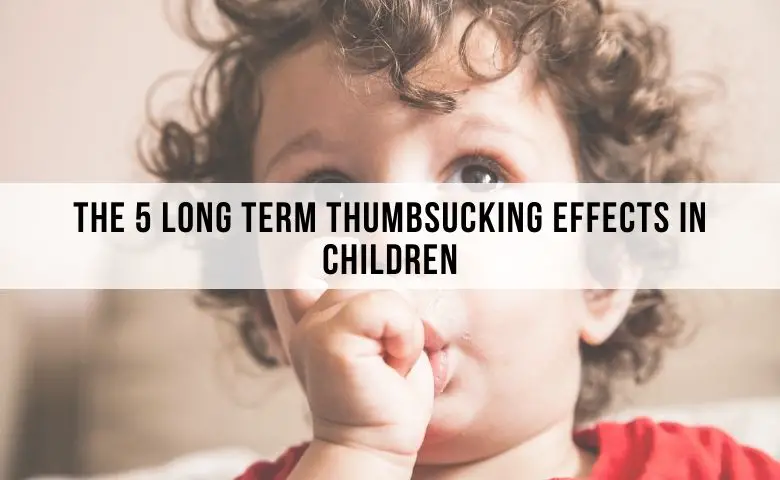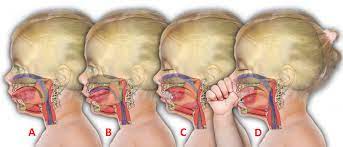5 Lifelong Thumbsucking effects for children and what you can do about it
Children love to suck their thumbs. It is a way for them to feel comforted and safe, and it is something that they have done since they were babies. Infants often use thumb-sucking as a way to calm themselves and to sleep.
Thumbsucking is a very common habit in the early years and can have both positive and negative consequences. Many parents rely on pacifiers, teething toys, and other items to suck on to help their children overcome this habit.

The good news is that most children give up thumbsucking on their own by age five or six!
However, if the habit of thumb-sucking or pacifier use is excessive or for a long time past the toddler stage, it can be detrimental to your child’s dental health.
This article will discuss what those long-term effects are so you can make an educated decision on whether or not you want your child to continue sucking their thumb for comfort.
Why Do Babies Suck Their Thumbs?
babies are born with a need to suck. It’s their natural reflex that gives the babies the comfort of nursing. Babies instinctively learn to suck their thumb or a pacifier to soothe and calm themselves. Sucking on their thumb is a self-soothing method for infants that helps them relax at naptime or bedtime.
This habit is an extension of the soothing sensation babies experience when drinking milk from a bottle or breastfeeding. The sucking reflex enables their brain to release opiate-like substances called beta-endorphins that can produce either a euphoric or calming effect.
An actual change in body chemistry takes place when a child sucks his thumb, experts say.
When should a child stop thumb sucking?
The timing of when to stop thumb chewing is different for every child. Usually children leave thumb-sucking when they get busy learning new skills and they need no need to soothe.
This is usually around the age of two to three years old, but it can be earlier or later depending on their personality and what they are doing with their hands. Beyond 5 to 6 years of age, the thumbsucking habit outweighs the benefits.

According to the American Dental Association, the best time to discourage thumb sucking is before the child turns five.
Because if chewing thumb becomes a habit it can lead to dental problems such as a misalignment of the teeth or a chipped tooth. There are also pyschological consequences of thumbsucking which will be discussed further in the article.
Side effects of thumbsucking – Issues in Thumbsucking children
Tooth Misalignment
Thumbs and pacifiers both exert pressure on your child’s gums when sucking. This can cause severe damage to teeth from thumbsucking.
Constant pressure on the gums at the time of teething can lead to issues such as splayed teeth, outward sloping teeth, or overbite.
As your child grows and starts to get permanent teeth, the misalignment becomes highly noticeable.
Problems with Malocclusion
Malocclusion is the misalignment of upper and lower teeth. Malocclusion can lead to open bite or overbite conditions.
An open bite is when the upper and lower teeth do not touch even when the mouth is closed.
An overbite means that the front teeth excessively overlap the bottom teeth. Both these conditions may make it difficult for your child to chew normally or cause speech issues.
Changes to Jaw & Facial Development
From infancy to adolescence, a child’s face goes through many changes, and excessive use of pacifiers or thumb-sucking in kids can affect the orofacial complex’s development.
The orofacial complex includes the jaw, muscles of the mouth and face, and teeth. As a result of thumb-sucking, the jaw needs to re-position itself to help your child speak, chew and bite normally.
Such a misalignment can have consequences on your child’s facial appearance and may need extensive treatment.

Speech Impediment
The adverse effects of thumb-sucking can be seen in the development of the jaw, teeth and palate. It is also responsible for causing speech impediment in children.
Speech problems caused by thumb-sucking include lisping and mispronunciation of sounds such as ‘D’ and ‘T’. Correct dental care and high-quality speech therapy may be needed for your child to overcome speech impediments caused by thumb-sucking and pacifier use.
Skin Problems
Thumb-sucking can not only cause oral issues among children, but it also affects the skin of the preferred thumb of your child.
Constant exposure to mouth moisture can make the thumb skin deteriorate, making it vulnerable. Children who constantly suck their thumb experience serious skin problems on the thumb they prefer to suck.
The skin on the thumb may become scaly, dry, cracked, or infected very easily.
How can I break this thumbsucking habit?
- Encourage the child to do an activity that involves chewing with their mouth, such as eating or chewing gum
- Help distract your child if they are in a thumb-biting habit by drawing attention away from them. Give them something else to chew on. Give him some modeling clay, squeeze ball, or any other alternative.
- One thing you shouldn’t do is replace your child’s thumb-sucking habit by giving him a new pacifier habit. Pacifier sucking also creates the same tooth damage as a thumb-sucking can. Plus pacifiers are prone to germs. So it’s a no-no when it comes to switching from thumbsucking to pacifier sucking.
- For most children, the thumb-chewing activity helps them escape from hunger and boredom. If you feed them well chances are that this habit will go away soon. Try to give them healthy and wholesome foods.
- If your child is still chewing their thumb at the age of two, you can take them to a doctor who might recommend that they wear a thumb protector.
- Create positive distractions for your child, such as finding a fun new toy or game that will keep them busy and their hands occupied
- Avoid making it seem like an issue by not drawing attention to the thumb chewing habit when you find out about it in order to help reduce its severity.
- Reinforce your child’s efforts to stop thumb chewing by giving them a reward system.
- Buy books or watch videos that help encourage children to kick the habit. The Berenstein Bears Bad Habit and Thumbs Up Brown Bear are two great potty training books.
- Finally, if you notice they are having a hard time giving up the habit, you can speak to a professional about it.
How Your Dentist Can Help With These Problems
When you bring your child to a dentist for regular check-ups, the dentist can identify any cavities or problem areas with their teeth and gums.
The examination includes an x-ray that can identify overbites, open bite, and other orthodontic problems.
Your dentist can help rectify these issues with various orthodontic treatments after your child attains a certain age, including metal braces, ceramic braces, and invisible braces.
Depending on your child’s face and jawline’s orthodontic structure, your dentist will be able to suggest the correct treatment.
The American Dental Association says that children should ideally stop the habit of thumb-sucking and pacifier use between the ages of two to four years.
The consequences of thumb-sucking and using a pacifier in your child’s growth years can be severe and long-lasting. The sooner you help your child stop this habit, the better.
A final note on thumbsucking habit in children
Social situations and peer pressure usually help a child to figure out when this thumbsucking habit is not acceptable and can lead to their bad image.
Each child is different and you need to make sure what works best for your child. It’s important to pay attention to your child’s cues and when he is ready to give up this habit.
And remember no matter how dire the situation may seem, every child outgrows this habit eventually, and yours will too! 🙂
Related Articles:
Potty Training Tips For First Time Parents: 10 Strategies To Consider
10 Ways To Boost Your Family’s Immune System
15 Foods That Help You Sleep Better
7 Best Brain Boosting Foods For Kids
23 First Aid Kit Essentials Every Mom Needs To Have
Don’t Forget To Pin It For Later!

5 Lifelong Thumbsucking effects for children: What you can do about it

Sharon William
Sharon William is the head of digital marketing at Koch Orthodontics in Loganville, GA. She loves to create compelling content which can connect straight with the audience clearing all the clutter aside. Her focus area is dental health issues and their solutions. She knows the power of a genuine smile and passionately works towards educating her readers about that. She wants them to understand how they can improve their smile and overall lifestyle. She likes to arrange small meets in her neighborhood to discuss the topics on which she writes.

Very detailed and insightful post.
Thank you ❤️
Thank you so much xoxo